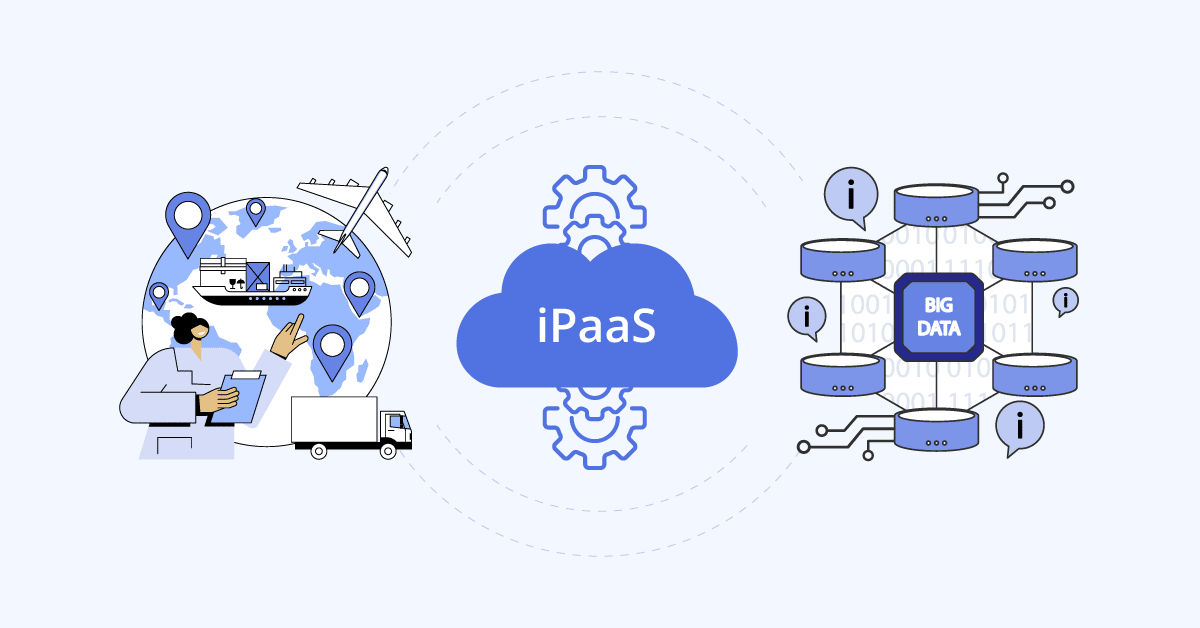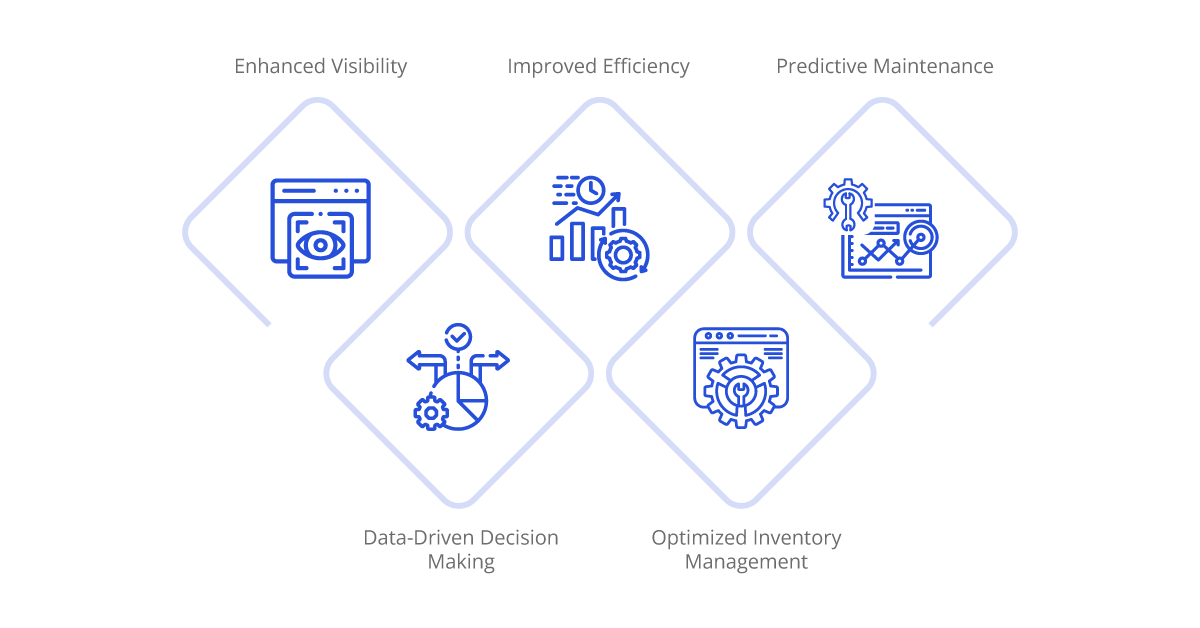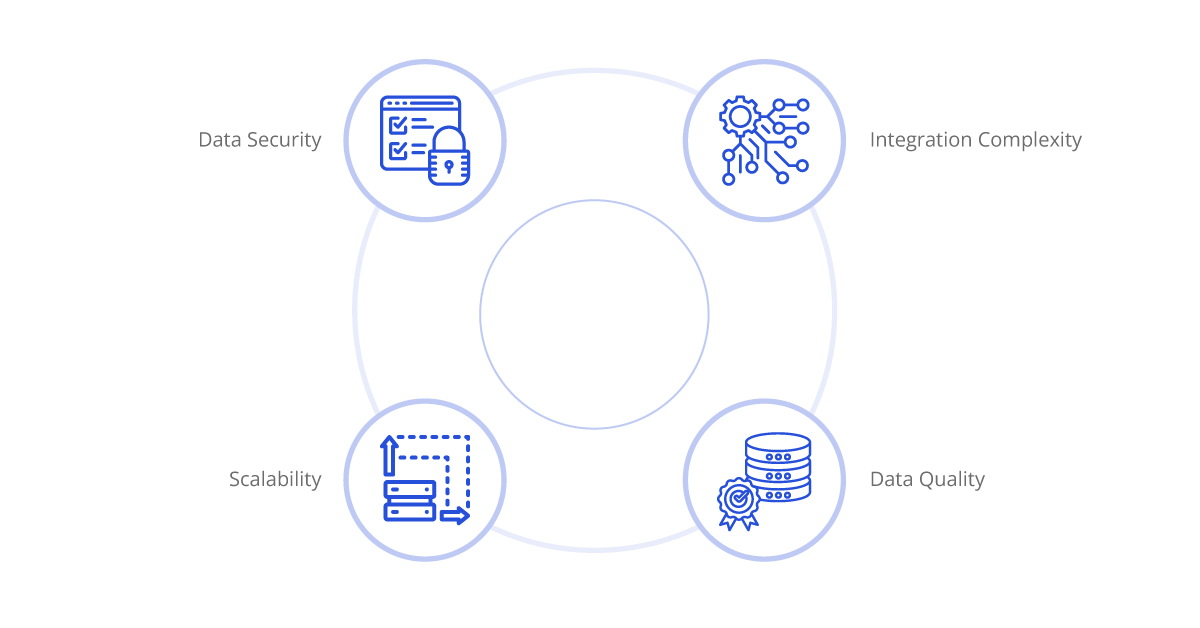The modern logistics landscape is evolving rapidly, driven by technological advancements and the ever-growing demand for efficient supply chain management. In this dynamic environment, integrating iPaaS (Integration Platform as a Service) with big data analytics has emerged as a game-changer for optimizing logistics operations. By harnessing the power of data insights, companies can streamline processes, enhance visibility, and ultimately, deliver better customer experiences.
Understanding iPaaS
iPaaS, short for Integration Platform as a Service, is a cloud-based solution that facilitates the integration of various applications, systems, and data sources across an organization. Unlike traditional integration methods that require extensive coding and maintenance, iPaaS offers a more agile and scalable approach to connectivity. With iPaaS, businesses can easily connect disparate systems, automate workflows, and exchange data in real time.
Aonflow iPaaS – Free for First 3 Months!
Build and run up to 1,500 transactions monthly with no cost. No payment info needed!
The Role of Big Data in Logistics
Big data plays a pivotal role in the logistics industry, revolutionizing the way businesses manage their supply chains and operations. Within the logistics realm, big data encompasses a plethora of information, ranging from traditional shipping records and inventory levels to more nuanced data like customer feedback and emerging market trends. This comprehensive dataset provides logistics companies with a wealth of insights that can be leveraged to enhance various aspects of their operations.
At its core, big data in logistics offers a treasure trove of information that enables companies to gain a deeper understanding of their supply chains. By analyzing historical shipping data, businesses can identify patterns and trends in transportation routes, transit times, and delivery performance. This insight allows them to optimize their logistics networks, streamline transportation processes, and reduce shipping costs.
Moreover, big data empowers logistics companies to make more informed decisions regarding inventory management. By analyzing real-time inventory levels and demand forecasts, businesses can optimize their stock levels, minimize excess inventory, and avoid stockouts. This not only improves operational efficiency but also enhances customer satisfaction by ensuring that products are available when and where they are needed.
In addition to improving operational efficiency, big data analytics enables logistics companies to enhance customer experiences. By analyzing customer feedback and sentiment data, businesses can gain valuable insights into customer preferences, pain points, and expectations. This allows them to tailor their services to meet the unique needs of their customers, whether it’s providing more accurate delivery estimates or offering personalized recommendations.
Furthermore, big data analytics enables logistics companies to adapt to changing market dynamics and consumer behavior. By monitoring market trends, economic indicators, and competitor activities, businesses can identify emerging opportunities and threats in the marketplace. This proactive approach to data analysis allows companies to stay ahead of the curve, anticipate market shifts, and capitalize on new growth opportunities.
Benefits of Integrating iPaaS with Big Data
Enhanced Visibility
The integration of iPaaS with big data analytics offers logistics companies unparalleled visibility into their supply chain processes. By amalgamating real-time data streams from various sources, such as GPS trackers, RFID tags, and inventory management systems, businesses can monitor the movement of goods from the point of origin to the final destination. This comprehensive visibility allows them to track shipments in transit, anticipate potential delays or disruptions, and take proactive measures to mitigate risks.
Furthermore, by leveraging advanced analytics tools, companies can gain insights into historical performance data, enabling them to identify trends, patterns, and areas for improvement within their supply chain network.
Improved Efficiency
Automation lies at the heart of iPaaS, empowering businesses to streamline their operations and eliminate manual inefficiencies. By seamlessly integrating iPaaS with big data analytics, logistics companies can harness the power of predictive analytics to optimize their workflows and resource allocation processes.
For instance, predictive analytics algorithms can analyze historical data on transportation routes, order volumes, and inventory levels to forecast future demand patterns accurately. Armed with these insights, businesses can optimize their routing and scheduling decisions, ensuring timely deliveries while minimizing fuel costs and reducing carbon emissions.
Moreover, by automating routine tasks such as order processing, invoicing, and inventory replenishment, companies can free up valuable time and resources, allowing employees to focus on more strategic activities that drive business growth.
Optimized Inventory Management
Big data analytics serves as a game-changer in the realm of inventory management, providing logistics companies with valuable insights into stock levels, demand fluctuations, and supplier performance metrics.
By integrating iPaaS with big data analytics platforms, businesses can access real-time inventory data from across their supply chain network, enabling them to optimize their inventory management strategies accordingly. For example, predictive analytics algorithms can analyze historical sales data, market trends, and seasonal fluctuations to forecast future demand accurately. Armed with these insights, companies can adjust their inventory levels, reorder points, and safety stock thresholds to minimize stockouts, reduce carrying costs, and maximize inventory turnover rates.
Furthermore, by integrating inventory management systems with supplier portals and e-commerce platforms, businesses can automate the procurement process, enabling them to replenish stock levels automatically based on predefined triggers and thresholds.
Predictive Maintenance
For logistics operations reliant on a fleet of vehicles or machinery, predictive maintenance can significantly enhance operational efficiency and reduce downtime costs. By integrating iPaaS with big data analytics platforms, companies can leverage data from IoT sensors, telematics devices, and equipment diagnostics to monitor the health and performance of their assets in real time.
For instance, predictive analytics algorithms can analyze sensor data to detect early signs of equipment malfunction or failure, enabling maintenance teams to intervene proactively before a breakdown occurs. By adopting a predictive maintenance approach, businesses can minimize unplanned downtime, extend the lifespan of their assets, and reduce maintenance costs over time.
In today’s fast-paced and highly competitive business environment, data-driven decision-making has become a critical success factor for logistics companies. By integrating iPaaS with big data analytics platforms, businesses can access timely and accurate insights into their operations, enabling them to make informed decisions that drive business growth and profitability.
Whether it’s optimizing delivery routes, adjusting inventory levels, or reallocating resources, having access to real-time data and actionable insights empowers logistics managers to respond quickly to changing market conditions and customer demands. Furthermore, by leveraging advanced analytics tools such as machine learning and artificial intelligence, companies can uncover hidden patterns, correlations, and opportunities within their data, enabling them to gain a competitive edge in the market.
Challenges and Considerations
While the benefits of integrating iPaaS with big data analytics are clear, there are several challenges and considerations to keep in mind:
Data Security
As logistics companies embrace the integration of iPaaS with big data analytics, they must prioritize data security to safeguard sensitive information from unauthorized access, breaches, and cyber threats.
With the exponential growth in data volume and exchange, maintaining the privacy and integrity of data has become a paramount concern. Robust security measures, including encryption, access controls, and user authentication protocols, are essential to protect data at rest and in transit. Moreover, compliance with regulatory requirements such as GDPR and HIPAA is imperative to avoid legal repercussions and financial penalties.
Integration Complexity
Integrating multiple data sources and systems poses a significant challenge for logistics companies, requiring meticulous planning and execution. The complexity of data integration stems from the diverse formats, structures, and protocols of disparate data sources, ranging from legacy systems to cloud-based applications.
Choosing the right iPaaS solution with robust integration capabilities is crucial to streamline the integration process and ensure seamless connectivity between systems. Additionally, implementing effective data integration strategies, such as data mapping, transformation, and synchronization, is essential to harmonize data across disparate sources and maintain data consistency and accuracy.
Scalability
As logistics companies expand their operations and scale their business, their data integration needs evolve accordingly. It’s essential to choose an iPaaS solution that can scale with the organization and accommodate future growth seamlessly.
Scalability encompasses not only the ability to handle increasing data volume but also the flexibility to adapt to changing business requirements and technological advancements. By selecting a scalable iPaaS solution, logistics companies can future-proof their data integration infrastructure and avoid costly migrations or system overhauls down the line.
Data Quality
The accuracy and reliability of data are fundamental to effective decision-making and business performance. Poor data quality, characterized by errors, inconsistencies, and inaccuracies, can undermine the credibility of insights derived from big data analytics. Addressing data quality issues requires robust data governance practices, including data cleansing, validation, and enrichment.
By implementing data quality tools and processes, logistics companies can ensure that their data is accurate, complete, and up-to-date, thereby enhancing the reliability and trustworthiness of insights derived from big data analytics. Additionally, establishing data quality metrics and monitoring mechanisms is essential to continuously assess and improve data quality over time.
Aonflow is the leading integration platform.
You can kick-start by integrating your first-ever workflow in just a matter of minutes.
Case Studies: Real-World Applications
Amazon: Optimizing Fulfillment Centers
Amazon, the global e-commerce giant, has revolutionized the retail industry through its relentless focus on customer satisfaction and operational excellence. Central to its success is the strategic integration of iPaaS with big data analytics to optimize its vast network of fulfillment centers worldwide. By leveraging a wealth of data on customer orders, inventory levels, and shipping routes, Amazon has transformed its logistics operations, delivering unparalleled speed, efficiency, and reliability to millions of customers worldwide.
Through the integration of iPaaS, Amazon seamlessly connects its diverse array of systems and applications, enabling real-time data exchange and collaboration across its supply chain network. This seamless connectivity allows Amazon to monitor inventory levels, track shipments, and manage orders with unprecedented visibility and control. By harnessing the power of big data analytics, Amazon can analyze historical order data, forecast demand trends, and optimize inventory stocking levels, ensuring that products are available when and where customers need them.
Furthermore, Amazon utilizes sophisticated algorithms and machine learning models to optimize its fulfillment processes and minimize delivery times. By analyzing data on shipping routes, traffic patterns, and carrier performance, Amazon can dynamically adjust its logistics operations to route packages through the most efficient and cost-effective channels. This proactive approach to route optimization enables Amazon to minimize shipping costs, reduce transit times, and maximize customer satisfaction.
Overall, Amazon’s strategic integration of iPaaS with big data analytics has transformed its fulfillment centers into highly efficient, data-driven operations that set the benchmark for excellence in the logistics industry. By harnessing the power of data insights, Amazon continues to push the boundaries of innovation, delivering unparalleled value and convenience to its customers worldwide. (source)
UPS: Route Optimization
United Parcel Service (UPS), one of the world’s largest package delivery companies, relies on iPaaS and big data analytics to optimize its delivery routes and reduce fuel consumption. With a vast fleet of vehicles traversing millions of miles each day, route optimization is critical to UPS’s operational efficiency and environmental sustainability.
Through the integration of iPaaS, UPS connects its fleet management systems, GPS trackers, and telematics devices to gather real-time data on vehicle location, speed, and fuel consumption. This real-time visibility allows UPS to monitor its fleet’s performance and identify opportunities for optimization. By leveraging big data analytics, UPS analyzes a myriad of factors, including traffic patterns, weather conditions, package volumes, and delivery schedules, to optimize its routes and minimize fuel consumption.
UPS’s route optimization algorithms utilize predictive analytics to forecast traffic congestion, identify alternative routes, and optimize delivery schedules in real time. By dynamically adjusting its routes based on changing conditions, UPS can minimize idle time, reduce fuel consumption, and lower carbon emissions. This proactive approach to route optimization not only saves time and money but also contributes to UPS’s sustainability goals by reducing its environmental footprint. (source)
Conclusion
The integration of iPaaS with big data analytics offers significant opportunities for optimizing logistics operations. By harnessing the power of data insights, companies can enhance visibility, improve efficiency, and make informed decisions that drive business success.
While challenges exist, the benefits of this integration are clear, paving the way for a more agile, responsive, and competitive logistics industry.
Aonflow iPaaS – Free for First 3 Months!
Build and run up to 1,500 transactions monthly with no cost. No payment info needed!


